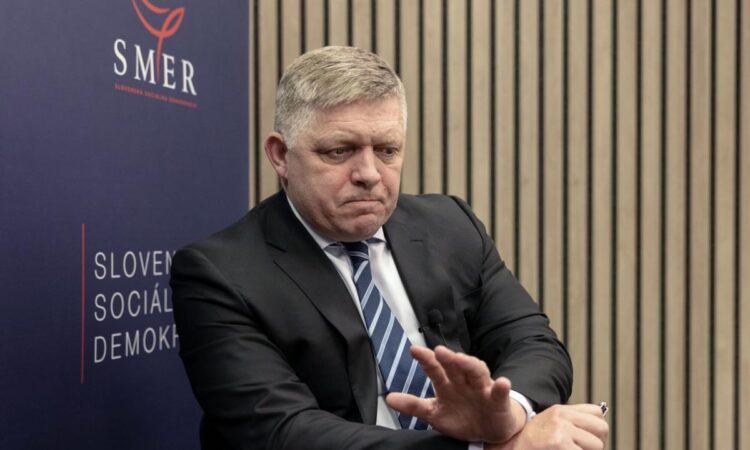
(Bloomberg) — A former prime minister who’s derided the European Union’s sanctions against Russia and pledged to end military aid to Ukraine won Slovakia’s election, delivering a fresh blow to Western unity.
Most Read from Bloomberg
Robert Fico is on track to return to the eastern EU nation’s premiership after Saturday’s vote, adding to the tide of nationalist and populist forces in Europe. The parties have have gained traction by tapping into voters’ frustration over the lingering impact of Covid pandemic, the region’s cost-of-living crisis, and fatigue over the war in Ukraine.
The result especially deepens the wedge among allies regarding assistance to Kyiv as Ukraine looks to turn back Russia’s invasion, now into its 20th month. As the votes were counted in Slovakia, US lawmakers omitted some $6 billion in Ukrainian aid as part of a last-minute bid to avoid a government shutdown — showing that funding more US support is becoming harder. Hungary, which has blocked EU military aid, balked this weekend at Ukrainian overtures to unlock funds.
“Slovakia has bigger problems than Ukraine,” Fico told reporters in Bratislava Sunday, even as he moderated his tone on the nation’s foreign policy, saying he has no intention of shifting it away from the EU and NATO.
Mikulas Hanes, head of research at pollster NMS Slovakia, said that Fico is likely to forge an alliance with Hungarian Prime Minister Viktor Orban, delaying or mitigating EU policy if not outright blocking it.
“Robert Fico is a complication for the EU — they won’t have it easy with him,” Hanes said.
Fico’s Smer party secured 22.9% of the vote, well ahead of main rival Progressive Slovakia, which had 18%, according to the Statistics Office. The next EU test will be in Poland on Oct. 15, when the nationalist Law & Justice party seek a third term.
The dominant political figure in the eastern European nation of 5.4 million since the fall of communism, 59-year-old Fico made his pitch with a pledge to boost social spending and challenge EU policy on issues ranging from migration to security to climate.
He resigned in 2018 after a burst of public outrage following the killing of an investigative reporter who probed corruption in Slovakia. The Smer leader served for a decade over three terms after first elected in 2006.
Fico’s return dashed the hopes of Progressive Slovakia, a pro-EU party that campaigned to keep the nation more closely in line with the European mainstream. Polls in the final weeks of the campaign showed them closing the gap, while exit polls late Saturday had the party with a slim edge.
‘Guess Who’s Back!’
Fico will still need to find partners to form a government. Although Slovakia’s fractious politics makes coalition building a challenge, Smer has potential partners in Voice, led by his successor as premier, Peter Pellegrini, and the Slovak National Party, which has opposed migration and LGBTQ rights. The three parties would have a majority.
Progressive Slovakia also has a path to a majority, but it would involve a potentially unwieldy coalition of multiple parties.
Like Orban, Fico has tapped into anxiety in an electorate that is among the most pro-Russian in the 27-member bloc. He was abetted by a social media campaign that included several false claims, making the election a test case for new EU legislation that aims to staunch the spread of illegal or harmful online content.
“Guess who’s back!” Orban posted on social media platform X, formerly Twitter, early Sunday, congratulating Fico: “Always good to work together with a patriot.”
In his previous stints as premier, Fico’s rhetoric was stronger than his actions when it came to the EU — taking a hard line with a domestic audience, while showing a measure of pragmatism in Brussels.
“He’ll pick up his battles carefully, because he’ll need European funds,” said Milan Nic, a senior research fellow at the German Council on Foreign Relations.
Slovakia has a track record of political tumult and fractious coalitions, with nine governments since it entered the EU in 2004. Party infighting helped bring down the cabinet of Prime Minister Eduard Heger late last year, an alliance that was elected in 2020 to tackle corruption.
A new government will have to grapple with a widening budget deficit in Slovakia’s $115 billion economy. The euro-area member will need to secure as much as €10 billion ($10.6) from financial markets next year.
Once a Social Democratic reformer, Fico has embraced a populist wave that’s swept Europe — denouncing asylum seekers, opposing Ukraine’s NATO aspirations, and deriding Slovakia’s reformist president, Zuzana Caputova, as an “American agent.”
(Adds Fico comments in fourth paragraph.)
Most Read from Bloomberg Businessweek
©2023 Bloomberg L.P.






